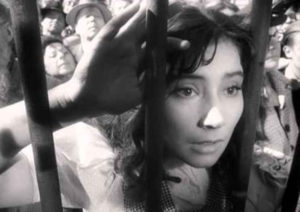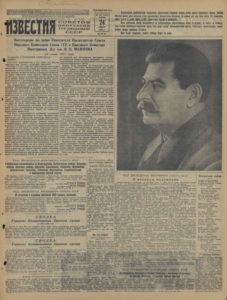Learn Russian through Songs – Red Army Marches
Very quickly, let me tell you about myself! My name’s Richard Wess and I’m the creator of RussianFilmHub.com. Russian Film Hub is a library of free Russian and Soviet movies with English subtitles. You can filter by genre, decade, director, etc. Basically, it’s the website I wish had existed when I was studying Russian as an undergraduate student. I hope Russian Film Hub is a resource you find useful in your Russian learning process!
Watching Russian movies is a great way to improve your language level. And I for sure recommend Angelos’s detailed course for learning the Russian cases through the excellent film, The Irony of Fate / Ирония судьбы! I also think it’s super helpful to watch as many Russian movies as you can. If you’d like to do that in the company of other Russian enthusiasts, please join my new Russian Film Club Facebook group.
Red Army Marches – A Great Way to Improve Your Vocabularly
Angelos has created some superb resources for improving your Russian using music. He’s covered great songs like Кустурица, Вечная молодость, and Звезда.
I’d like to add to Angelos’s Russian song resources by sharing with you my love for Red Army marches!
Every language has topics that make for a good way to improve your speaking and understanding of the culture. For Russian, such a topic is war.
When you visit Russia, consume Russian literature, or explore Russian cinema, many of the places you see, books you read, and films you watch portray the Second World War or Russian revolution.
Red Square is drenched in military memorials and constantly paraded on. Novels like Grossman’s “Life and Fate” or Tolstoy’s “War and Peace” are some of the finest works of literature ever. And you can find no more harrowing, influential war cinema than movies like “Come and See” and “Ivan’s Childhood.”
What’s more, when you talk to Russians, war is a subject that often comes up.
The three marches below – Farewell of Slavianka, We Spin the Earth, and Sacred War – should prove helpful to you in improving your language level and connecting to Russians. I hope the backstory of each song gives you something to talk about with Russians and I also hope that you can retain some vocabulary from these songs’ beautiful lyrics.
Try dropping a phrase like «Пусть ярость благородная вскипает, как волна» (“Let the noble fury boil over like a wave”) during your next conversation with a Russian. I assure you, you will have a more lively discussion than ever before!
Farewell of Slavianka / Прощание славянки
Прощание славянки translates as “Farewell of the Slavic woman.” It’s one of the most well-known Russian marching songs of the past century. It plays at most every Russian parade.
The composer of this song, Vasily Agapkin, created it in 1912, inspired by the struggle of his fellow Slavs and Orthodox Christians in the First Balkan War. Soon after, Farewell of Slavianka became popular across the Russian Empire and was used constantly during the First World War.
The early Soviet regime turned against Farewell of Slavianka during the Russian Civil War, as it was used as the unofficial anthem of the Imperial White Army. However, the song remained widespread.
The song was performed during the Red Square parade on November 7, 1941. That famous ceremony saw Stalin bid farewell to Red Army soldiers setting out to join the bloody Battle of Moscow.
After the war, the song underscored a heartrending scene in the Palme d’Or-winning film, The Cranes Are Flying / Летят журавли. In this scene, the main character, Veronika, desperately tries to bid farewell to her lover, Boris, as he marches out with his volunteer unit. However, the crowded streets prevent her from doing so.

The Cranes Are Flying / Летят журавли (1957) – Veronika tries to bid Boris farewell
And so, The Cranes Are Flying perfectly showcases the combination of national pride and collective sacrifice that epitomizes Farewell of Slavianka. Yes, the song honors those who go off to fight for their homeland. However, as its title says, the song also remembers the women who stay behind and wait for their men who go off to war.
Прощание Славянки lyrics (1967 version)
There are various versions of the lyrics of this song. The 1967 version is the one you’ll hear most often.
Этот марш не смолкал на перронах
В дни, когда полыхал1 горизонт.
C ним отцов наших в дымных вагонах
Поезда увозили на фронт
Он Москву отстоял2 в сорок первом
В сорок пятом шагал на Берлин
Он с солдатом прошел до Победы
По дорогам нелегким годин3
И если в поход4
Страна позовет5
За край наш родной
Мы все пойдем в священный бой
(2 раза)
Шумят в полях хлеба
Шагает Отчизна6 моя
К высотам счастья сквозь все ненастья7
Дорогой мира и труда
К высотам счастья сквозь все ненастья
Дорогой мира и труда
Припев.
Прощание Славянки vocabulary
- полыхал – was burning
- отстоять – to defend
- година – times
- поход – march, campaign;
- позвать – call to go
- отчизна – motherland
- ненастье – troubles (bad weather)
We Spin the Earth / Мы вращаем землю
We Spin the Earth is originally a “bard” song by Vladimir Vysotsky that became something of a marching tune. However, I would be remiss to not bring it up, as it is one of Vysotsky’s finest compositions.
Vysotsky was a Soviet singer-songwriter (“bard” / «бард»), actor, and poet of the utmost impact on Soviet culture. He had a unique way of composing folk songs and a full-throated singing technique that make his songs hard to forget. We Spin the Earth is one of these.

Vladimir Vysotsky in 1979, a year before his untimely death at 42
We Spin the Earth is a masterpiece of metaphor that describes how Soviet soldiers first retreated and subsequently rotated the entire earth to push back against the Nazis and win the Second World War.
Throughout the song, Vysotsky creates a universe that describes the Nazi advance into the Soviet Union as taking the sun out of its correct position.
«Но мы помним, как солнце отправилось вспять
И едва не зашло на Востоке.»“But we remember how the sun went back
And almost set in the East.”
Vysotsky then paints the picture that the heroic effort of Soviet soldiers literally turned the world around against the Nazis to put the sun in its right place once again.
«Ось земную мы сдвинули без рычага,
Изменив направленье удара.
…
Землю тянем зубами за стебли.»“We moved the earth’s axis without a lever
Having changed the direction of the blow.
…
We pull the earth by the stems with our teeth.”
I thoroughly recommend this song as an enjoyable work of art and also as a useful tool to learn some interesting vocabulary through Vysotsky’s colorful turns of phrase.
Мы вращаем землю lyrics
От границы мы Землю вертели назад –
Было дело, сначала.
Но обратно ее закрутил1 наш комбат2,
Оттолкнувшись ногой от Урала.
Наконец-то нам дали приказ наступать3,
Отбирать наши пяди4 и крохи5,
Но мы помним, как солнце отправилось вспять6
И едва не зашло7 на Востоке.
Мы не меряем8 Землю шагами,
Понапрасну цветы теребя9,
Мы толкаем ее сапогами –
От себя, от себя.
И от ветра с Востока пригнулись стога10,
Жмется11 к скалам отара12.
Ось13 земную мы сдвинули без рычага14,
Изменив направленье удара15.
Не пугайтесь, когда не на месте закат16.
Судный день17 – это сказки для старших.
Просто Землю вращают18, куда захотят,
Наши сменные роты19 на марше.
Мы ползем20, бугорки21 обнимаем22,
Кочки тискаем23 зло, не любя,
И коленями Землю толкаем24 –
От себя, от себя.
Здесь никто не найдет, даже если б хотел,
Руки кверху поднявших25.
Всем живым – ощутимая польза26 от тел:
Как прикрытье27 используем павших28.
Этот глупый свинец29 всех ли сразу найдет,
Где настигнет30 – в упор31 или с тыла?
Кто-то там впереди навалился32 на дот33 –
И Земля на мгновенье застыла.
Я ступни34 свои сзади оставил,
Мимоходом35 по мертвым скорбя36,
Шар земной я вращаю локтями37 –
От себя, от себя.
Кто-то встал в полный рост и, отвесив поклон38,
Принял пулю39 на вдохе40,
Но на Запад, на Запад ползет батальон,
Чтобы солнце взошло на Востоке.
Животом41 – по грязи42, дышим смрадом43 болот,
Но глаза закрываем на запах44.
Нынче по небу солнце нормально идет,
Потому что мы рвемся45 на Запад!
Руки, ноги – на месте ли, нет ли, –
Как на свадьбе, росу пригубя46,
Землю тянем зубами за стебли47 –
На себя, на себя!
Мы вращаем землю vocabulary
- обратно закрутил – turned around
- комбат – battalion commander
- наступать – attack
- пядь (земли) – small piece of land
- кроха – crumb
- вспять – backwards
- солнце зашло – sun set
- мерить – measure
- теребить – tinker
- стога – hey stack
- жмется – lean to
- отара – flock of sheep
- ось – axis
- рычаг – lever
- удар – blow, punch
- закат – sunset
- судный день – judgment day
- вращать – turn
- рота – company
- ползти – crawl
- бугорок – hillock
- обнимать – hug
- тискаем кочки – squeeze hummocks
- толкать – push
- руки кверху поднявших = сдавшихся – surrendered
- ощутимая польза – notable advantage
- прикрытье – shield
- павший – fallen (dead)
- свинец – lead
- настигнуть – catch up with
- в упор – point blank
- навалиться – to close
- дот – fire from bunker
- ступни – foot
- мимоходом – by the way
- скорбеть – grieve
- локоть – elbow
- отвесить поклон – bow
- пуля – bullet
- на вдохе – while inhaling
- живот – belly
- по грязи – in the mud
- смрад – stench
- запах – smell
- рвемся – strive to get
- росу пригубя – tasting dew
- землю тянем зубами за стебли – We pull the earth by the stems with our teeth
Sacred War / Священная война
Sacred War was the Soviet Union’s primary rallying cry during World War Two.
Nazi Germany invaded the Soviet Union on June 22nd, 1941. Two days later, the Soviet poet, Vasily Lebedev-Kumach, published the lyrics to Sacred War. And within a day of that, the composer of the Soviet national anthem, Alexander Alexandrov, put it to music.

Священная война – published in Известия on 24th June, 1941 (right side, below Stalin picture)
Soon thereafter, Sacred War would play every morning on Soviet radio.
At the beginning of the war, Sacred War was initially seen as too dark for mass appeal. However, as the Nazi invasion turned into a brutal total war, the lyrics to Sacred War became an appropriate anthem for the tumult the Soviets faced.
The lyrics to Sacred War are steeped in mythic grandeur. The song describes the “noble fury” of the Soviets “boiling over like a wave” over the “damned Fascist hordes”, “the rotten Fascist scum”.
I encourage you to reuse some of the vocabulary from Sacred War next time you talk about war with a Russian. There isn’t another military song that excites the Russian heart more. Afterall, every time this song is performed, Russians stand up out of respect for it and what it signifies.
Священная война lyrics
Вставай, страна огромная,
Вставай на смертный бой
С фашистской силой темною,
С проклятою1 ордой2.
Пусть ярость3 благородная4
Вскипает, как волна, —
Идет война народная,
Священная война!
Как два различных полюса,
Во всем враждебны5 мы.
За свет и мир мы боремся,
Они — за царство тьмы.
Дадим отпор6 душителям7
Всех пламенных идей8,
Насильникам9, грабителям10,
Мучителям11 людей!
Не смеют12 крылья13 черные
Над Родиной летать,
Поля ее просторные
Не смеет враг топтать14!
Гнилой15 фашистской нечисти16
Загоним пулю в лоб,
Отребью17 человечества
Сколотим крепкий гроб18!
Пойдем ломить всей силою,
Всем сердцем, всей душой
За землю нашу милую,
За наш Союз большой!
Встает страна огромная,
Встает на смертный бой
С фашистской силой темною,
С проклятою ордой!
Священная война vocabulary
- проклятый – damned
- орда – horde
- ярость – fury
- благородная – noble
- враждебны – hostile
- дадим отпор – to rebuff, fight back
- душитель – oppressor
- пламенные идеи – flaming ideas
- насильник – tyrant
- грабитель – robber
- мучитель – torturer
- не сметь – don’t dare
- крылья – wings
- топтать – trample
- гнилой – rotten
- нечисть – scum
- отребье – waste, rubbish
- сколотить гроб – to make a coffin

Leave A Comment